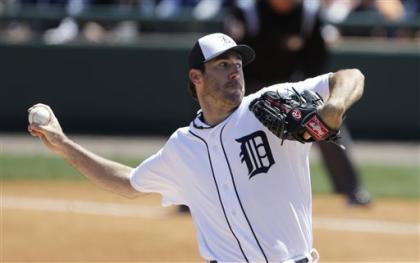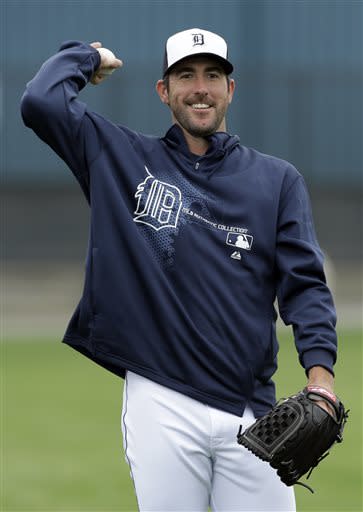Justin Verlander's $180 million contract a savvy investment for Tigers
Someone was going to give Justin Verlander the $200 million he wanted. The free-agent market is baseball's Bellevue, and teams go particularly mad for elite players. The Detroit Tigers knew this, and before anyone else had the opportunity, they broke the game's first rule of fiscal responsibility: Do not give pitchers long-term contracts.
The seven-year, $180 million contract they guaranteed Verlander on Friday (with a $22 million vesting option that could kick it over $200 million) set a new record for a pitcher. This is the market. The market is stupid. The players' association and agents did a brilliant job of setting it such that top position players and pitchers make about the same amount of money, even though every pitcher should get FRAGILE tattooed onto the arm with which he throws.
That, the Tigers and others believe, is where Verlander differs. Never mind we're exactly a day removed from Johan Santana, a bastion of durability during his Cy Young years with Minnesota, resigned to a second major shoulder surgery, one that very well could end his career.
If there is anyone who's a sure thing, people around baseball agree, it is Justin Verlander – he of six straight 200-plus-inning seasons, of a Cy Young and two more top-three finishes the last four years, of the fastball that has this incredible way of gaining velocity as the game goes on.
[Related: Tigers ace Justin Verlander signs record five-year extension]

When it comes to staying healthy, nobody has been better than Verlander. And that, he said, is no accident.
"I definitely think there's a skill," Verlander told Yahoo! Sports in February. "I think 99 percent of it is delivery. Some guys put a lot more stress on levers than others. So far" – he knocked on his wooden locker – "I've been one of those guys who hasn't."
Nobody knows if it's a skill or genetics or hard work or mechanics or luck or, most likely, a combination of the above. Three executives surveyed Friday were of two minds about the deal. They understood why the Tigers did it – "I'd have done the same thing," one said – but were frightened by the idea of Verlander as this bastion of infallibility, as Nolan Ryan 2.0.
Ryan was a freak. Verlander may, too, be a freak. Guaranteeing seven years like the Tigers did with Verlander and the Mariners with Felix Hernandez – hell, guaranteeing six, like the Phillies did Cole Hamels, or even five, as the Giants did Matt Cain – is betting on an outlier. Baseball wastes $600 million a year on injured players, and teams still line up to lavish money on the most injury-prone of all.
Verlander believes his durability comes from his mechanics. They are, to the naked eye, quite magnificent: smooth, no hitch, strong glove arm, hardy foot strike, wonderful extension – the sort that ought to hold up if only it were so easy.
"I actually looked at a picture from Little League recently," Verlander said. "And I was like, 'Oh, that looks familiar.' I was 7 years old, and it was almost the same as where I'm at right now. I was right at the point where I'm about to throw, and it looked pretty good. It's just the way I threw. I've fine-tuned it. Mechanics have been reined in. But the way my arm gets up, which I think is a huge key to putting stress on your elbow, is far less stressful."
[Also: Giants' Buster Posey gets record deal for a catcher]

Loading the scapula – a trick pitchers use to gain velocity – is, in Verlander's mind, cheating, and he believes it puts additional stress on the elbow and can cause failure. Verlander generates his velocity with the combination of superior size (6-foot-6 and 225 pounds) and a delivery in which he drops his arm and allows the rest of his body to bring it through. It's low stress, he said. The sort that should hold up.
"There are those guys who shoot through the minor leagues like Verlander or Felix Hernandez," said Angels pitcher C.J. Wilson, who has studied the arm in great detail. "Pretty sure those guys are going to be around for a long time. They're kind of freaks because they threw really hard at a young age, so they don't need to do anything different. They just hone their type of success.
"Justin Verlander doesn't need to be a changeup pitcher. He's a fastball pitcher and a strikeout pitcher. He's a power pitcher. He's going to be that way until he's at least 40. He has so much fastball, he has to lose 10 mph before he's an off-speed pitcher."
The difference between Verlander and Hernandez is in their fastball velocity. While velocity is by no means the only indicator of long-term arm health, it can raise red flags. When Hernandez arrived in Seattle in 2005, his fastball averaged 95.8 mph. Last season, after a gradual decline, it dipped to 92.1 mph. Verlander's, on the other hand, has never strayed much from the 95.1 mph of his first full season. Last year, his fastball sat at 94.3 mph, and no starter threw more triple-digit pitches.
Better yet, Verlander doesn't think this deal will take him to the end of his career. The option for 2020 vests if he finishes in the top five of the Cy Young voting in 2019, and even then, it would leave him a free agent at 38.
"I don't plan on being done at 40," he said. "I guess history says I will, but probably not."
[Baseball 2013 from Yahoo! Fantasy Sports: Join a league today!]
History says a lot of things. History says paying one pitcher $180 million is lunacy. History says at some point or another, Verlander's arm is going to cry uncle like almost everyone else's. History says the Tigers are tethering themselves to something they could come to regret.
Of course, history loses its luster when the best pitcher in baseball wants to commit himself for less than free agency would mint him, and when everything from the outside and in the MRI looks so good, and when you can't help but get a little drunk on those strikeouts and no-hitters and all the other wonderful moments he provides.
The market is the market despite history, and so while it's easy to look at this deal and spit at it simply because of the years, perhaps it's more accurate to see it this way: Pitchers are going to get paid, and if there is any pitcher who warrants a contract like this, it's Justin Verlander.
Other popular content on Yahoo! Sports:
• Rumeal Robinson watching Michigan from prison
• Kobe injury adds to Lakers woes as they hobble toward finish line
• QB Mark Sanchez learning West Coast offense under former pro
